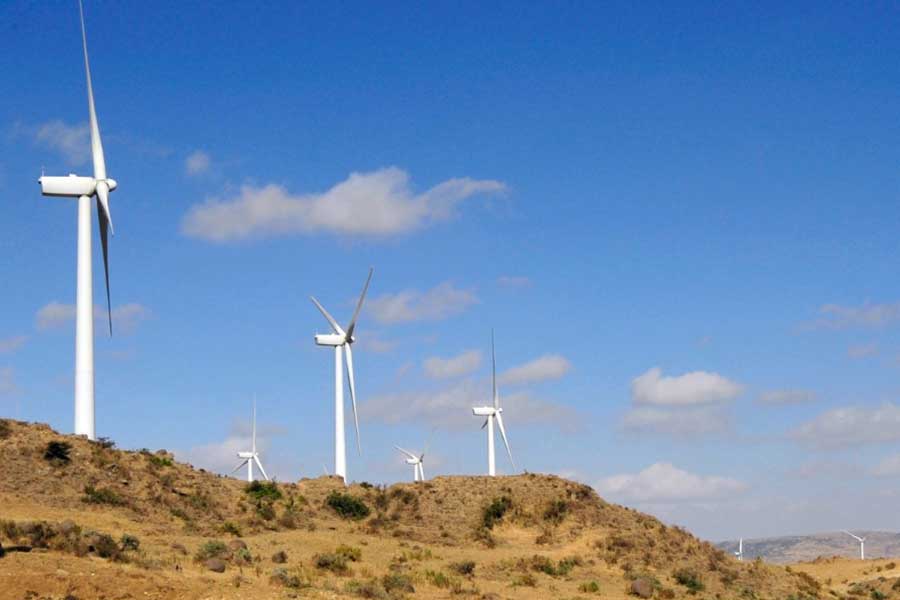
Oct 31 , 2020
By Atsede Woldie , Brychan Thomas
Financial institutions should be proactive and find innovative ways to accommodate women. The glass ceiling is thick and tough. The GERD is only one way of weakening the hold. Access to finance is the other, write Atsede Woldie and Brychan Thomas, professors at the University of South Wales.
As the most important project for Ethiopia in recent times, the Grand Ethiopian Renaissance Dam (GERD) is expected to generate considerable electric energy to ameliorate major developmental problems apparent in the country. These include difficulties with employment, health care, education, access to water and food security.
It is without question that these challenges fall heavily on women. Projects such as these that provide major benefits will create opportunities for the emancipation of women’s socioeconomic conditions in Ethiopia.
In essence, GERD will enable cost effective use of energy. Through access to electricity at home, this will help women to gain better education. It will also involve up-to-date drilling technology for water provision with better use of freshwater in wells, and improved health care facilities will also become available through access to energy. The outcome of all of these actions will make itself felt in greater income generation for women.
A better supply of electricity will result from improved energy provision for the service sector and existing industry, enabling greater capacity and the opening-up of industries. Through this, there will be employment and business opportunities that will benefit women. Of course, to ensure that they make use of the increased opportunities open to them, they will need access to finance as well as education and employment.
The gender gap in countries like Ethiopia has been reported to be more severe, women struggle to start new ventures and access finance from formal banking institutions. It should be a matter of concern in Africa for several main reasons.
Primarily, there is the private sector. In agriculture and informal businesses, there is a high degree of involvement by women. In Africa, over a third of businesses are actually owned by women, but a majority of them are in the informal sector, according to the African Competitiveness Report.
There is also the matter of the ability of women to grow their businesses, to increase productivity and job creation, which is hampered by existing institutional and legal barriers that affect SMEs owned by women and men differently. Lastly, and most importantly, there is solid evidence at the micro level supporting the presence of gender disparities putting women at a disadvantage and thus reducing their growth potential.
It is crucial to examine to what extent the gender financial barrier in terms of accessibility affects women. This can be done by examining if SMEs owned by women are more constrained in accessing finance than those owned or managed by men in terms of the “perceived gender financial barrier.”
Gender and access to finance from formal financial institutions, mainly banks, has raised discussions in the literature, because SMEs owned by women are growing and are starting to represent a considerable share in the small business sector. Since female entrepreneurs are also believed to be more risk-averse, it is likely that they will have a lower demand for credit than men.
There are conflicting arguments and evidence as to whether SMEs owned by women face gender-specific problems while seeking external bank finance. Some researchers argue that women face greater difficulties dealing with banks, and there is a possible perceived discrimination that gives a preference to male entrepreneurs while seeking finance.
Consequently, this discourages women to seek external finance even when they are in need, which makes them use less debt finance than men holding other characteristics equal, as it was shown in the study "SMEs' access to debt finance: A comparison of male-owned and female-owned businesses in Ghana," by African researchers Joshua Yindenaba Abor and Nicholas Biekpe. In addition, SMEs owned by women are relatively small at start-up, because the owners choose to engage in sectors that do not require considerable funds.
It does not help either that female entrepreneurs are significantly less likely to seek external credit than males because they have an internalised fear of rejection, according to a 2012 study, "The impact of gender on SME characteristics and access to debt finance in South Africa." A possible reason could be because they do not have enough networking and connections like men. Nevertheless, regarding access to finance, the same study did not really find any significant differences in the availability of debt between both sexes, thus they concluded that women have equal access to debt when they apply. It is an indication of what is likely to be the main cause of why women are placed at a disadvantage compared to their male counterparts - the present adverse discrimination existing in the lending process.
Older studies in fact demonstrated this by separating access to credit and terms and conditions under which credit is obtained. The terms under which women access credit are not appealing and more constraining than those of their male counterparts, as it was found in the academic journal article "Access to Capital and Terms of Credit: A Comparison of Men- and Women-Owned Small Businesses," by Susan Coleman (PhD). For instance, women were charged high-interest rates and requested to provide higher valued collateral on smaller loans than men.
The problem becomes more complicated considering the factors that do not have to do with finance institutions themselves. Studies show that while there is evidence women are disadvantaged in accessing financial credit, the reasons lie more in other dimensions related to female inclusion in the modern market economy such as education and the labour force.
This is why the GERD in itself will only go so far in creating opportunities for women. Critical actors, such as the government and financial institutions, need to be engaged as well. The government should deepen or increase the support it offers to women as the economic conditions and financial system of the country do not allow women to acquire finance favourably from financial institutions.
Financial institutions should be proactive and find innovative ways to accommodate women. The glass ceiling is thick and tough. The GERD is only one way of weakening the hold. Access to finance is the other.
PUBLISHED ON
Oct 31,2020 [ VOL
21 , NO
1070]

Fortune News | Sep 06,2020

Fortune News | Jul 02,2022


Radar | Aug 26,2023

Fortune News | Dec 27,2018

Photo Gallery | 178952 Views | May 06,2019

Photo Gallery | 169150 Views | Apr 26,2019

Photo Gallery | 160018 Views | Oct 06,2021

My Opinion | 137127 Views | Aug 14,2021
Commentaries | Oct 25,2025

Dec 22 , 2024 . By TIZITA SHEWAFERAW
Charged with transforming colossal state-owned enterprises into modern and competitiv...

Aug 18 , 2024 . By AKSAH ITALO
Although predictable Yonas Zerihun's job in the ride-hailing service is not immune to...

Jul 28 , 2024 . By TIZITA SHEWAFERAW
Unhabitual, perhaps too many, Samuel Gebreyohannes, 38, used to occasionally enjoy a couple of beers at breakfast. However, he recently swit...

Jul 13 , 2024 . By AKSAH ITALO
Investors who rely on tractors, trucks, and field vehicles for commuting, transporting commodities, and f...

Oct 25 , 2025
The regulatory machinery is on overdrive. In only two years, no fewer than 35 new pro...

Oct 18 , 2025
The political establishment, notably the ruling party and its top brass, has become p...

Oct 11 , 2025
Ladislas Farago, a roving Associated Press (AP) correspondent, arrived in Ethiopia in...

Oct 4 , 2025
Eyob Tekalegn (PhD) had been in the Governor's chair for only weeks when, on Septembe...

Oct 25 , 2025 . By YITBAREK GETACHEW
Officials of the Addis Abeba's Education Bureau have embarked on an ambitious experim...

Oct 26 , 2025 . By YITBAREK GETACHEW
The federal government is making a landmark shift in its investment incentive regime...

Oct 29 , 2025 . By NAHOM AYELE
The National Bank of Ethiopia (NBE) is preparing to issue a directive that will funda...

Oct 26 , 2025 . By SURAFEL MULUGETA
A community of booksellers shadowing the Ethiopian National Theatre has been jolted b...